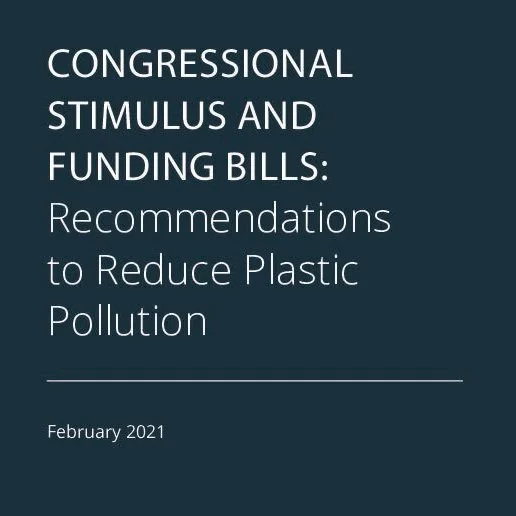Congressional Stimulus and funding Bills: Recommendations To reduce Plastic Pollution
Publication Date: February 4, 2021 | 257 organizations in the #BreakFreeFromPlastic movement, including Beyond Plastics
This 12-page report identifies 13 priorities, totaling no less than $1.3 billion for the Biden-Harris Administration and Congress to include in a stimulus package, infrastructure bill, and/or climate change legislation in order to address the devastating impacts caused by plastic pollution and help transform the country’s extractive, throwaway culture into a regenerative, inclusive one that is good for our economy and environment.
1. $150 Million for Government Facilities, Educational Institutions, and Public Lands To Shift To Reusable Products
2. $25 Million to Investigate and Pursue Violations of Environmental Laws by the Petrochemical Industry in Environmental Justice Communities
3. $6 Million to Install Water Refill Stations to Replace Single-Use Plastic Water Bottles at National Parks and Across Public Lands
4. $50 Million to the Environmental Protection Agency (EPA) to Improve Data Collection and Better Regulate the Plastics Industry
5. $150 Million for Research on the Health Impacts of Plastics
6. $500 Million to the EPA for Recycling Programs and Materials Recovery Facilities for Non-Plastic Recyclables
7. $250 Million for Composting
8. $50 Million to Develop Waste Reduction, Reuse and Refill Systems
9. $1 Million for the Architect of the Capitol to Reduce Single-Use Plastic in the Capitol and Legislative Offices
10. $25 Million for Green Chemistry
11. $50 Million for AmeriCorps
12. $20 Million to the EPA’s Clean Water State Revolving Fund for Stormwater, Trash, and Debris Capture Systems and Green Infrastructure Design
13. $25 Million for Reducing and Mitigating Plastic in the Ocean
These recommendations address the immense damage caused across the full plastic supply chain: namely, gas extraction, production, manufacturing, distribution, use in consumer products, and disposal, which often takes the form of plastic waste being buried in landfills, dumped in waterways, or burned in incinerators. The policy solutions focus both “upstream” on eliminating the source of plastic production and its negative impacts, and “downstream” on mitigating the impacts in communities, on land, and in our oceans and rivers.
The plastic pollution crisis is an environmental justice emergency because the petrochemical industry, and the waste that it creates, disproportionately harms people of color and low-income communities. The federal government has the responsibility to protect historically marginalized people from the lasting damage imposed on them by corporate polluters.
The recommendations also make clear that “to effectively reduce plastic pollution and stimulate economic growth, it is essential that the Administration and Congress do not promote false solutions in federal spending bills and other actions.” The coalition highlights five items that should not be included in any federal actions.


